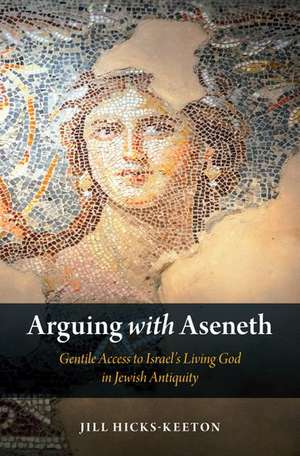Arguing with Aseneth: Gentile Access to Israel's Living God in Jewish Antiquity
Autor Jill Hicks-Keetonen Limba Engleză Hardback – 3 ian 2019
Preț: 546.22 lei
Preț vechi: 782.50 lei
-30% Nou
Puncte Express: 819
Preț estimativ în valută:
104.52€ • 113.89$ • 88.07£
104.52€ • 113.89$ • 88.07£
Carte tipărită la comandă
Livrare economică 12-18 aprilie
Preluare comenzi: 021 569.72.76
Specificații
ISBN-13: 9780190878993
ISBN-10: 0190878991
Pagini: 232
Dimensiuni: 160 x 236 x 33 mm
Greutate: 0.54 kg
Editura: Oxford University Press
Colecția OUP USA
Locul publicării:New York, United States
ISBN-10: 0190878991
Pagini: 232
Dimensiuni: 160 x 236 x 33 mm
Greutate: 0.54 kg
Editura: Oxford University Press
Colecția OUP USA
Locul publicării:New York, United States
Recenzii
A lively study, I recommend the incorporation of Arguing with Aseneth into all libraries supporting the study of early Judaism and/or Christianity without reservation.
Arguing with Aseneth is to be commended for its engaging prose, provocative and carefully-argued thesis, and treatment of various Second Temple traditions that productively inform Joseph and Aseneth. It is essential reading not only for those working on Joseph and Aseneth, but for all who engage in the context and literature of Second Temple Judaism.
...This book is an important contribution to the question of Jewish attitudes to Gentiles in Hellenistic Judaism, raising questions that go far beyond the particular case of Joseph and Aseneth.
Joseph and Aseneth presents an intriguing query into the function and intention of universal language. ...Hicks-Keeton participates in broader trends in the study of early Judaism which recognizes that later works incorporating scriptural stories did not merely comment on scriptural stories but crafted new tales of their own -- tales informed by the author's own historical contexts, concerns, and aspirations. The author of Joseph and Aseneth used the biblical story as a gateway to voice their own conceptions of Jewishness amidst a landscape of cultural contestation. Hicks-Keeton in Arguing with Aseneth listens to that creative voice and imagines the stakes of Aseneth's story for God-worshipping gentiles.
Arguing with Aseneth is to be commended for its engaging prose, provocative and carefully-argued thesis, and treatment of various Second Temple traditions that productively inform Joseph and Aseneth. It is essential reading not only for those working on Joseph and Aseneth, but for all who engage in the context and literature of Second Temple Judaism.
...This book is an important contribution to the question of Jewish attitudes to Gentiles in Hellenistic Judaism, raising questions that go far beyond the particular case of Joseph and Aseneth.
Joseph and Aseneth presents an intriguing query into the function and intention of universal language. ...Hicks-Keeton participates in broader trends in the study of early Judaism which recognizes that later works incorporating scriptural stories did not merely comment on scriptural stories but crafted new tales of their own -- tales informed by the author's own historical contexts, concerns, and aspirations. The author of Joseph and Aseneth used the biblical story as a gateway to voice their own conceptions of Jewishness amidst a landscape of cultural contestation. Hicks-Keeton in Arguing with Aseneth listens to that creative voice and imagines the stakes of Aseneth's story for God-worshipping gentiles.
Notă biografică
Jill Hicks-Keeton is Assistant Professor of Religious Studies at the University of Oklahoma, where she is also affiliate faculty in Judaic Studies. She taught previously at George Mason University in Fairfax, Virginia. In 2018, she was recognized as a Society of Biblical Literature Regional Scholar, having been nominated by the Southwestern Region.
